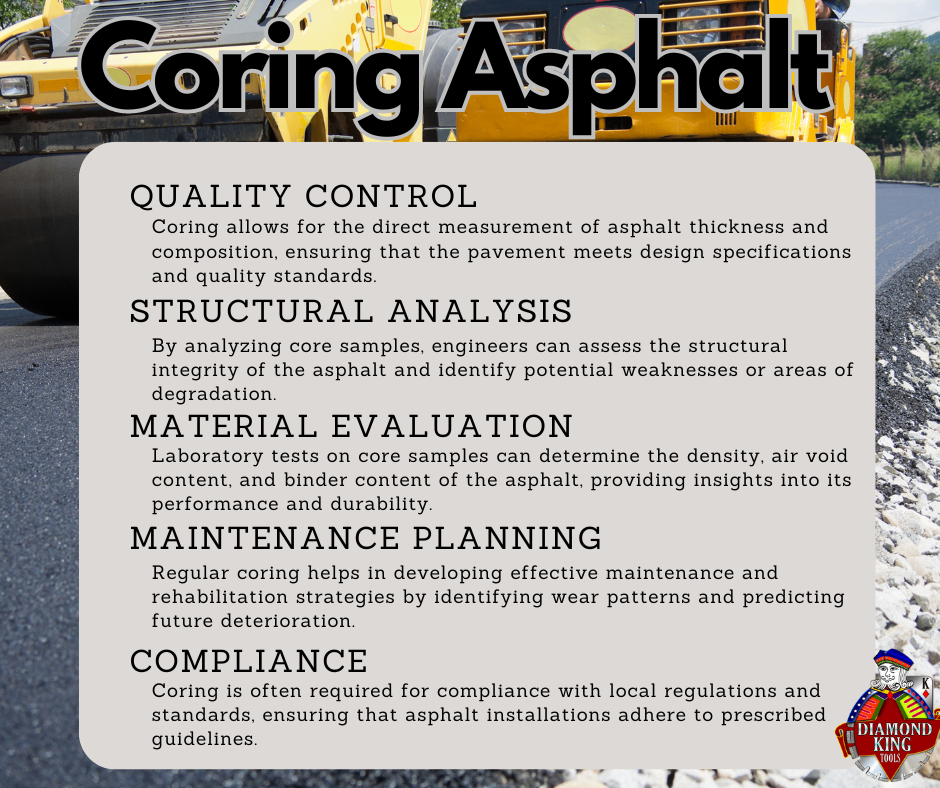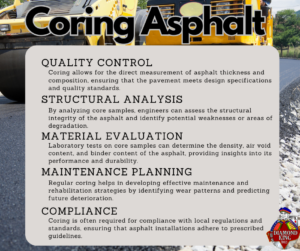Asphalt is a ubiquitous material, used in roads, driveways, parking lots, and many other applications. Its durability and resilience make it ideal for withstanding the stresses of vehicular traffic and environmental conditions. But maintaining and evaluating asphalt surfaces requires a deeper understanding of its properties, which is where coring comes in. In this blog, we will explore whether you can core asphalt, how the process works, and why it is essential for ensuring the longevity and safety of asphalt surfaces.
Can You Core Asphalt?
Yes, you can core asphalt. Coring is a common technique used to extract samples from asphalt surfaces for testing and evaluation. This process involves drilling a cylindrical sample from the pavement, which can then be analyzed for various characteristics such as thickness, composition, density, and structural integrity.
How Does Asphalt Coring Work?
Asphalt coring is a straightforward but precise process that requires specialized equipment and expertise. Here’s a step-by-step overview of how it works:
- Preparation:
- Identify the area to be cored and ensure it is clear of any obstacles.
- Mark the exact location where the core will be extracted.
- Equipment Setup:
- Use a core drilling machine equipped with a diamond-tipped core bit. Diamond bits are preferred because of their ability to cut through tough materials like asphalt and the aggregate within it.
- Attach the core bit to the drill and position the machine over the marked area.
- Drilling:
- Begin drilling at a slow speed to ensure accuracy and control.
- Apply steady pressure to penetrate the asphalt surface.
- Continue drilling until the core bit reaches the desired depth, typically extending through the asphalt layer and into the subbase.
- Extraction:
- Once the drilling is complete, carefully remove the core sample from the hole.
- Label and store the core sample for transport to a laboratory or for on-site analysis.
- Hole Repair:
- Fill the cored hole with fresh asphalt or a suitable patching material to restore the surface’s integrity.
Why Is Asphalt Coring Important?
Coring asphalt serves several critical purposes in the maintenance and management of paved surfaces:
- Quality Control:
- Coring allows for the direct measurement of asphalt thickness and composition, ensuring that the pavement meets design specifications and quality standards.
- Structural Analysis:
- By analyzing core samples, engineers can assess the structural integrity of the asphalt and identify potential weaknesses or areas of degradation.
- Material Evaluation:
- Laboratory tests on core samples can determine the density, air void content, and binder content of the asphalt, providing insights into its performance and durability.
- Maintenance Planning:
- Regular coring helps in developing effective maintenance and rehabilitation strategies by identifying wear patterns and predicting future deterioration.
- Compliance:
- Coring is often required for compliance with local regulations and standards, ensuring that asphalt installations adhere to prescribed guidelines.
Conclusion
Coring asphalt is a crucial process for anyone involved in the construction and maintenance of paved surfaces. It provides valuable data that helps ensure the quality, safety, and longevity of asphalt pavements. Whether for routine inspections, quality control, or forensic analysis, asphalt coring is an indispensable tool in the arsenal of civil engineers and pavement specialists.
So, the next time you drive on a smooth, well-maintained road, remember that beneath the surface, coring has played a vital role in ensuring that your journey is safe and comfortable.



